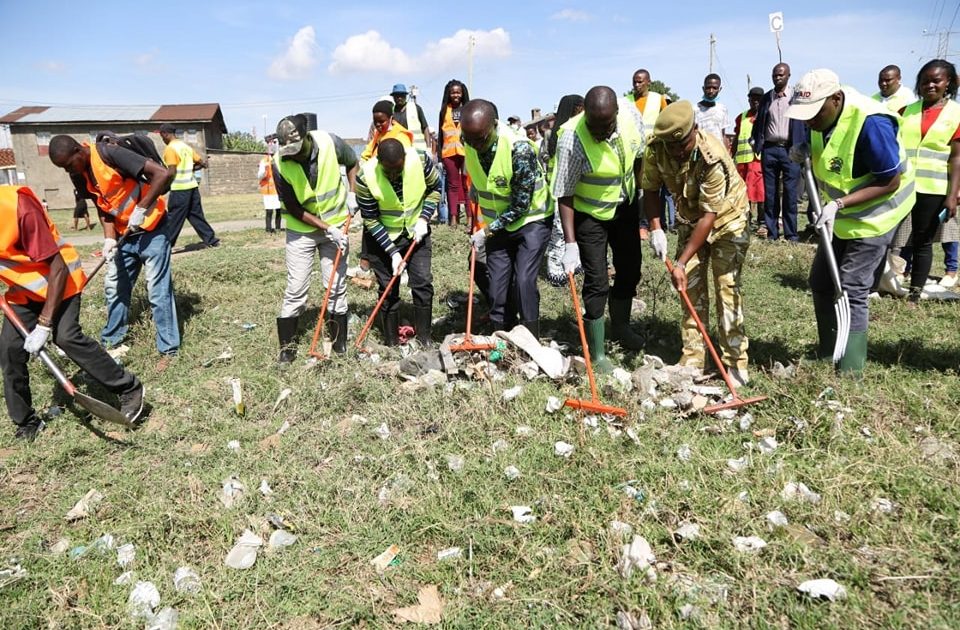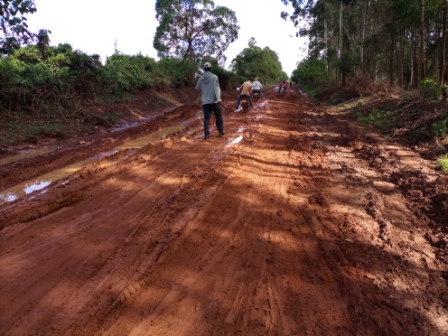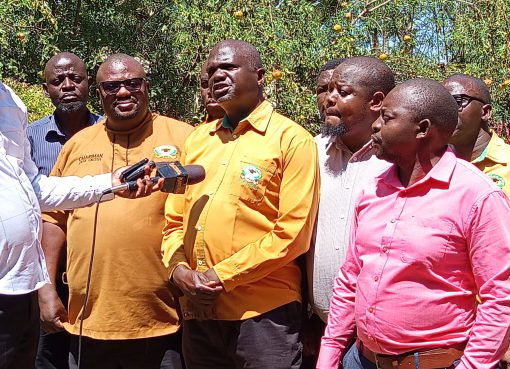The County Government of Nakuru has unveiled environmental conservation programs to address climate change and safeguard the livelihoods of communities across the devolved unit.
The county administration has also called on architects and developers to adopt sustainable construction practices that reduce the industry’s adverse impact on the environment, as the county government will support only the projects which pass the sustainability scorecard.
Speaking at Ponda Mali market on Monday where he participated in a cleanup exercise, Deputy Governor Mr. David Kones urged Kenyans to have a unity of purpose in restoring the ecosystem adding that it takes a collective effort to protect and safeguard the environment from all manner of pollution.
While noting that the construction industry was one of the biggest contributors to rapid climate change, Kones indicated that a lot of the sustainability focus has now shifted to the industry, which he said accounts for 40 percent of all the carbon emitted in the world.
Statistics given during the United Nations Climate Change Conference (COP27) held in Egypt in November last year, reveal that the manufacture of cement alone, for instance, is estimated to result in global emission of 2.8 billion tonnes of CO2 annually and that this could go up to 4 billion tonnes annually, should current rates of urbanization continue.
Indeed, mining and fabrication of construction materials have been known to have a negative impact on the environment, such as pollution of water sources, pollution of land, as well as increased carbon emissions.
Kones disclosed that Governor Susan Kihika’s administration was forging partnerships with the private sector aimed at promoting investments in technologies that convert solid waste into fertilizer and energy.
“Proper sanitation programmes, including adequate landfill sites, can help our devolved unit to improve the current state of solid waste management and save money. We must urgently exploit the energy potential stored in waste through available waste-to-energy technologies and also put in place a strategic action plan for implementation of these technologies,” he said.
The Deputy Governor observed that generation of power from waste has the potential of reducing environmental degradation and increasing employment opportunities.
Kones further encouraged producers, consumers and the government to switch to packaging options such as glass, aluminum cans, paper and boxed and metal bottles instead of single use plastics and noted that the latter were clogging drainages and waterways leading to flooding.
“Using recyclable glass and aluminum when making new bottles reduces the manufacturer’s carbon footprint, aluminum cans are also friendly as they are small, lightweight and airtight and not made from fossil fuels like plastic. They, therefore, contribute less to environmental problems such as acid rains and oxygen-free zones in water bodies,” he pointed out.
“We want to embrace and utilize such forums to create awareness on environmental conservation and more importantly educate our people on the economic value of waste that comes from waste recovery,” Kones added.
The Deputy Governor underscored the importance of the consumer being educated about the dangers of using plastic bottles and other packages to make more informed purchasing decisions. A little advocacy, he noted, will make a sizable change.
“Non-plastic packaging will forestall the effects of plastic on human beings, the environment and biodiversity as it will help to mitigate the pangs of climate change- hence more sustainable and resilient individuals, livelihoods and environment,” he said.
He said, “Over the years, increased manufacture and use of disposable plastics has led to clogged sewage systems, a dirty environment and choking lakes, seas and oceans.”
The United Nations Environment Programme observes that over 400 million tonnes of plastic are produced each year, with half of that amount used to create single-use items such as shopping bags, cups and straws.
At least 14 million tonnes of plastic end up in the ocean every year. Plastic debris is the most abundant type of litter in the ocean, accounting for 80 percent of all marine debris discovered from surface waters to deep-sea sediments.
In Nakuru, it is estimated that 1,400 tonnes of solid waste are generated every day, with 20 percent of that being in plastic form and mostly single use-plastic like straws, bottles and packaged consumer goods.
According to the Heinrich Boell Foundation, 400 million tonnes of plastic is produced annually and only less than 10 per cent is recycled. The foundation notes that plastics take over 400 years to degrade, which is dangerous to the environment, humans and animals.
Kones observed that domestic garbage can become a useful resource if it is properly sorted, classified and reused, adding that about half of this garbage is believed to be plastic waste, which can be recycled to generate income and reduce pollution.
“What we call waste is actually wealth. If we learn to separate waste at home instead of mixing plastic, whether bags or bottles with food remains, we can start making money. Empty beverage bottles, glass or plastic, old newspapers, broken umbrellas, clothing and metal can all be recycled,” he said.
The Deputy Governor explained that a tonne of waste paper can be recycled to produce 850 kilogrammes of recycled paper, saving 300 kilogrammes of timber.
“Recycled 1,000 kilogrammes of plastic bottles yields 700 kilogrammes of secondary raw materials for plastic manufacturing, while recycling a tonne of waste steel yields 900 kilogrammes of usable steel. This saves 47 percent in manufacturing costs, reducing air pollution by 75 per cent and reducing water pollution and solid waste dumping by 97 percent. Glass is also recyclable,” he pointed out.
Kenya in 2017 banned the use of single use plastic carrier bags, becoming a torchbearer in East Africa. “Plastics eventually get into the food chain as animals and fish eat them, confusing them for food,” states UN Environment in a report.
In Kenya, protected areas including national parks, forests or even beaches are some of the most affected by plastic pollution. This is because people on picnics, vacations, mountaineering and tourism litter with abandon.
In bid to have a cleaner, healthier and more serene environment, the government in 2019 banned single use plastics in all protected areas.
It means it is illegal to use disposable plastic plates, cups, straws, spoons, forks and water bottles (PET) in these protected areas. Other items, which are not allowed, are cigarettes because of cigarette butts, balloons and balloon sticks, food containers, crisps packets, sweet wrappers, bread bags and confectionery wrappers.
Kones indicated that the devolved unit was also promoting tree-planting drives adding, “The old generation has done a disservice to the environment by burning charcoal, logging and polluting rivers. When I was a young boy, rivers and springs were pristine. We had no bottled water, we drank directly from the river. Look at Ndarugu River now,” he lamented.
He added, “We need to grow trees as opposed to just planting them. When you plant a tree, you need to nurture it. We must refocus on climate action and smart agriculture. As the climate warms and the human population continues to rise, forests will be central to human survival. Forests serve as a natural safety net for livelihoods and protect us from severe effects of climate change.”
The Deputy Governor noted that food and vegetable waste makes up about a third of the contents of domestic dustbins as it contains up to 90 percent water. He indicated that separated from other waste, however, it can be made into compost and be of great use in agriculture and gardening.
During the event that was graced by County Executive Committee Member (CECM) in charge of Water, Environment, Energy, Climate Change and Natural resources Dr Nelson Maara, City Manager Mr Gitau Thabanja and Environment Chief Officer Mr Kennedy Mungai, over 10 tonnes of waste were collected from the surrounding areas of Mwariki, Top ten filling station, Ponda-Mali and Soko Mjinga fish market.
By Anne Mwale





